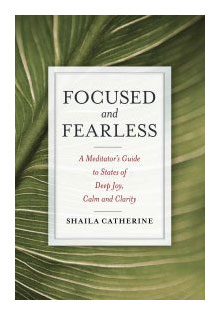
Focused and Fearless: A Meditator's Guide to States of Deep Joy, Calm, and Clarity, by Shaila Catherine

Our Members Recommend:
Buddhist Books for Northwest Readers
Focused and Fearless: A Meditator's Guide to States of Deep Joy, Calm, and Clarity
by Shaila Catherine
Shaila Catherine visited Seattle at the end of May promoting her book, Focused and Fearless, and leading meditation practice sessions. If there is one thing Catherine knows best – it is the very art of practice itself. Her warm presence radiated a centeredness gained by her rich meditative experience over more than seven years of accumulated silent retreat. Focused and Fearless is the first book of its kind written by an American laywoman. Offering an approachable and practical guide to the four "jhanas" (meditative absorptions), this book makes accessible these non-ordinary states. Noted as a landmark shift in Theravadan Buddhism, Focused and Fearless easily appeals to readers of all traditions – even to those who are non-meditators yet interested in establishing a practice.
What Makes You Not a Buddhist
by Dzongsar Jamyang Khyentse Rinpoche
“What Makes You not a Buddhist” provides relevant and timely insights for all Buddhist practitioners of any tradition. Khyentse Rinpoche relates fundamental Buddhist concepts of the Four Seals to our contemporary lives with skill and lightheartedness.
Dzongsar Jamyang Khyentse Rinpoche was born in Bhutan in 1961 and founded Siddhartha’s Intent International, which has a center in Vancouver, B.C. According to the Khyentse Foundation website, he “was recognized by H.H. Sakya Trizin, and received empowerments and teachings from many of the greatest lamas of Tibetan Buddhism, including H.H. the Dalai Lama, H.H. the 16th Karmapa, and his own grandfather, H.H. Dudjom Rinpoche.” One of his two major films is “The Cup” (1999), about two young Tibetan refugees and their quest to obtain a television for their remote monastery to watch the 1998 World Cup final. The other is “Travelers and Magicians.” (2003).
Chan Buddhism
by Peter D. Hershock
In its description of “Chan Buddhism” Amazon.com says that the tradition “has become paradigmatic of Buddhist spirituality. Known in Japan as Zen and in Korea as Son, it is one of the most strikingly iconoclastic spiritual traditions in the world. This succinct and lively work clearly expresses the meaning of Chan as it developed in China more than a thousand years ago and provides useful insights into the distinctive aims and forms of practice associated with the tradition, including its emphasis on the unity of wisdom and practice; the reality of ‘sudden awakening’; the importance of meditation; the use of ‘shock tactics’, the centrality of the teacher-student relationship; and the celebration of enlightenment narratives, or koans.
Peter D. Hershock is coordinator of the Asian Studies Development Program at the East-West Center, Honolulu. He has been a practicing Buddhist since 1982.
The End of Suffering
by Pankaj Mishra
Pankaj Mishra is a remarkable young Indian writer whose interest in Buddhism came through his development as a Western intellectual. The book interweaves his personal biography, the biography of the Buddha, and the Buddha’s teaching. How Mishra came to be interested in the Buddha as a result of his exposure to the discovery of the Buddha and the Dharma by the West rather than through his own lower middle-class Indian Hindu background makes for a fascinating read. It is also a simple exposition of the Buddha’s teaching...a real page-turner!
Pankaj Mishra was born in North India in 1969 and wrote his first book at 17. He wrote “The Romantics,” winner of the Los Angeles Times's Art Seidenbaum Award for First Fiction, and frequently contributes to The New York Review of Books and The Guardian. His most recent book is “Temptations of the West: How to Be Modern in India, Pakistan, Tibet, and Beyond.”
Little Pilgrim: A Novel
by Ko Un
Twice short-listed for the Nobel Prize in Literature, Ko Un is described by Gary Snyder as “not only a major spokesperson for all of Korean culture, but a voice for Planet Earth Watershed as well… Because of their purity, their nervy clarity, and their heart of compassion, his poems are not only Korean —they belong to the world.”
Contributions edited by Amy Groncznack, Julie Welch.